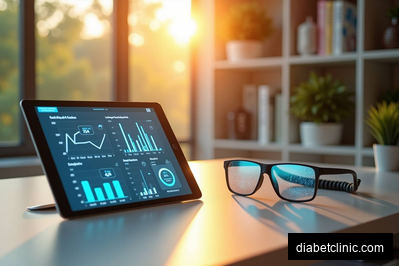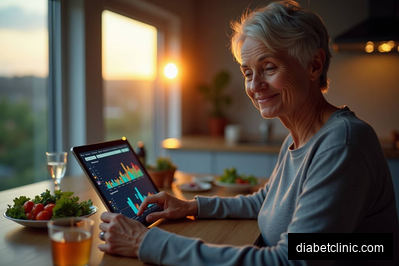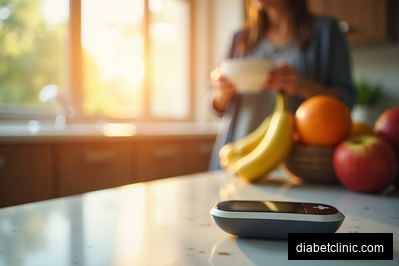Introduction
The ascent of technology has revolutionized every facet of human life, including healthcare. One area that has seen tremendous transformation due to this technological advancement is diabetes management. Traditionally, diabetes management was a laborious process with blood glucose testing, insulin injections, and constant monitoring. However, technology has streamlined the process, making it more efficient and less intrusive.
Today's patients have access to a plethora of tools, ranging from glucose monitoring devices to mobile apps, that assist in managing their condition. This blog post delves into the role of technology in modern diabetes management and discusses how these advancements have revolutionized care for diabetic patients.
In this Introduction, it's fascinating to explore how technological advancements have reshaped the landscape of healthcare. Telemedicine, for instance, has emerged as a game-changer, allowing patients to receive medical consultations from the comfort of their homes. This innovative approach has not only improved access to healthcare services but has also enhanced the efficiency of medical practitioners. Additionally, the utilization of artificial intelligence in diagnostics has revolutionized the speed and accuracy of medical assessments. As we delve deeper into this ever-evolving field, it becomes evident that technology is not just a tool but a catalyst for transformation in the healthcare industry.
Wearable Technology and Diabetes Management
Wearable technology has been a game-changer in diabetes management. Devices like Continuous Glucose Monitors (CGMs) and insulin pumps have made managing diabetes less intrusive and more manageable. CGMs, like the Dexcom G6, monitor glucose levels in real-time, providing constant updates to the user. This continuous monitoring helps users understand how different factors like food, exercise, and stress affect their glucose levels.
Insulin pumps, on the other hand, deliver insulin to the body without the need for multiple daily injections. These devices, such as the Medtronic Mini Med 670G, can also be paired with CGMs to automatically adjust insulin delivery based on the user's glucose levels. This integration reduces the risk of hypoglycemia and hyperglycemia, leading to improved control of blood sugar levels.
One notable advancement in wearable technology for diabetes management is the integration of insulin pumps with continuous glucose monitoring systems. This innovative combination allows for real-time monitoring of glucose levels and automatic insulin delivery, streamlining the management process for individuals with diabetes. Moreover, the emergence of smart insulin pens equipped with Bluetooth connectivity has further revolutionized diabetes care by enabling users to track insulin dosages and share data with healthcare providers seamlessly. These technological developments not only enhance convenience but also empower patients to take greater control of their health, ultimately leading to improved outcomes in diabetes management.
The Impact of Mobile Apps on Diabetes Management
Mobile applications have also made significant strides in diabetes management. Apps like My Sugr and Glucose Buddy allow users to log their glucose readings, carbohydrate intake, and insulin doses, providing a comprehensive view of their diabetes management. These apps also include features like reminders for medication and appointments, educational resources, and even the ability to share data with healthcare providers.
Furthermore, some apps integrate with wearable technology to provide real-time glucose readings and insulin dose recommendations. For instance, the Dexcom G6 app can display glucose readings from the Dexcom G6 CGM, eliminating the need for separate glucose meters.
In addition to tracking blood sugar levels and insulin intake, modern diabetes management apps are now incorporating advanced features like meal planning and exercise tracking. For instance, the app Glucose Buddy not only allows users to monitor their blood glucose readings but also provides personalized meal suggestions based on dietary preferences and health goals. Moreover, these apps have introduced innovative ways to connect users with healthcare professionals, enabling real-time consultations and feedback. This integration of comprehensive tools within mobile apps has revolutionized the way individuals with diabetes manage their condition, empowering them to make informed decisions and take control of their health.
Artificial Intelligence and Diabetes Management
Artificial Intelligence (AI) has also played a key role in modern diabetes management. AI algorithms can analyze vast amounts of data to predict blood glucose levels, recommend insulin doses, and even identify patterns that could indicate potential health risks. A prime example of this is the Medtronic Mini Med 670G, which uses AI to adjust insulin delivery based on the user's glucose levels.
Moreover, AI can also be used to analyze data from multiple sources, like wearable devices and mobile apps, to provide personalized diabetes management plans. This holistic approach to diabetes management not only improves blood sugar control but also empowers patients to take a more active role in managing their condition.
In the realm of diabetes management, Artificial Intelligence (AI) is revolutionizing personalized care. For instance, AI-powered glucose monitoring systems, like the latest continuous glucose monitors (CGMs), analyze data patterns to predict blood sugar trends, helping patients make proactive decisions to maintain optimal levels. Additionally, AI-driven insulin pumps can automatically adjust insulin dosages based on real-time glucose readings, reducing the risk of hypoglycemia or hyperglycemia. These advancements not only enhance patient outcomes but also alleviate the burden of constant monitoring and decision-making. As AI continues to evolve, the integration of machine learning and predictive analytics holds immense promise in transforming the landscape of diabetic care.
Conclusion
Technology has undeniably transformed the landscape of diabetes management. Wearable devices, mobile apps, and AI have made managing diabetes more efficient, less intrusive, and more personalized. These advancements not only improve blood sugar control but also empower patients to take a more active role in managing their condition.
Despite these advancements, it's essential to remember that technology is just a tool in diabetes management. A successful diabetes management plan still relies heavily on the patient's commitment to maintaining a healthy lifestyle, regular check-ups with healthcare providers, and adhering to their prescribed treatment plan. However, with the continued advancement of technology, the future of diabetes management looks brighter than ever.
In conclusion, the integration of technology in diabetes management has not only improved monitoring and treatment but has also empowered individuals to take control of their health in unprecedented ways. The utilization of wearable devices and mobile applications has enabled real-time tracking of blood sugar levels, physical activity, and dietary habits, offering personalized insights and recommendations for better management. Additionally, the advancement of telemedicine platforms has made it easier for individuals to connect with healthcare providers remotely, ensuring continuous support and guidance. As we embrace these technological advancements, it is crucial to prioritize data privacy and security to maintain trust and confidentiality in managing sensitive health information.








